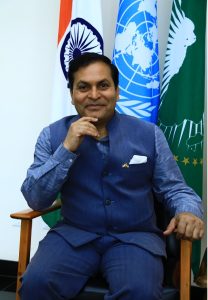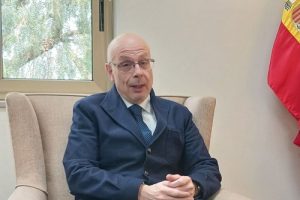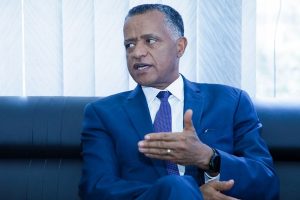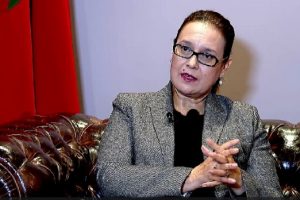
Ethiopia and India two oldest civilizations enjoy long standing diplomatic ties that has spanned more than seven decades. The relations rest on a firm foundation that covers many sectors including education, health, industry and trade among others and now BRICS is another important forum for cooperation.
Today’s Herald Guest is Mr Anil Kumar Rai, Indian Ambassador to Ethiopia and Permanent Representative to the African Union. The Ethiopian Herald had a brief stay with Ambassador Rai yesterday to have his view of the relations between the two countries. Have a nice read!
How do you see the overall progress of the strong diplomatic ties between India and Ethiopia over the years?
Ethiopia and India are two very important countries from the developing world, with historical ties going back to over 2000 years. Both countries enjoy exceptionally warm relationship in all spheres. Since I joined in February 2024, I have witnessed high-level exchanges between the leadership of both countries. On 17 August 2024, India hosted the ‘3rd Voice of Global South Summit’ with overarching theme ‘An Empowered Global South for a Sustainable Future’ where the leaders from the developing counties deliberated on strengthening collective efforts in addressing challenges faced by the developing world and its solutions which are suitable for the developing countries. Honorable Pime Minister of Ethiopia Abiy Ahmed Ali (PhD) and Finance Minister of Ethiopia Ahmed Shide participated in the Leaders Session and Finance Minister’s Session, respectively. In addition, we maintain a close contact at all levels. Now BRICS has emerged as a new platform for our continued, exchange of ideas, cooperation and coordination on bilateral, regional and global issues.
What do you think would be the importance of Ethiopia’s joining in BRICS for itself, the other member states as well as others?
BRICS is an organization which was started by four countries including India and South Africa joined later. India being the founding member, always believed in making it more representative of the aspirations of the developing countries and thus in its expansion Ethiopia, joined the bloc recently. In many ways Ethiopia represents the aspirations of Africa and a way forward for bringing development, modernization and addressing the needs of the people. We believe in the youth of this country and see that the ongoing comprehensive reforms have the potential to transform the economic landscape of Ethiopia. By joining BRICS Ethiopia get access to the alternate models of growth followed by various BRICS countries in diverse fields. Ethiopia may offer the realistic assessment of the developmental needs of Ethiopia and of the East African Region and also the models which might be best suited.

How is BRICS progressing? For instance recently it has launched a payment system.
The Core objective of BRICS is to have a model of economic governance system where the strengths of every country can be leveraged and they are not bind by any order or system, which is beyond their control. As you have mentioned that there is opportunity among the BRICS member countries to trade in their local currencies or get into currency swap agreements, this will facilitate trade among the BRICS members and reduce dependence on foreign currencies; this will provide better control over the currency management, and make the trading system resilient. This is work in progress, I feel it has a great future and of course countries like Ethiopia which has recent join BRICS may benefit out of such arrangements.
Ethiopia is taking measures to make business and investment easier particularly by leveling the ground for private participation, what is your view on this?
Economic liberalization of Ethiopia is quite timely and comprehensive. The country was passing through certain difficulty on its balance of payment, and I see that under the leadership of the Honorable, Prime Minister, Ethiopia has embarked on an ambitious agenda of using this as a lifetime opportunity to reform the economic structure and governance. Such reform process has wide ranging impact, it creates new opportunists for domestic as well as foreign players, and the competition would encourage everyone to grow and improve in various sectors like Agriculture, manufacturing, banking & finance, mining, services sector etc. Such reforms have potential to increase the attractiveness of the Ethiopian market among foreign investors and to improve the competitiveness of Ethiopia. India also has to pass through a similar reform process in 1991 and its continuing even today. So I’m optimistic that the way the things are moving, it will be good for Ethiopia, Ethiopian people and for the domestic as well as foreign investors.
How would Indian investors maximize benefit out of the reform?
India is the second largest investor in Ethiopia and the sectors in which we are largely invested is textile, Iron and Steel, Pharmaceuticals, agriculture and garmenting. Indian Business Forum is actively engaged with Ethiopian investment Commission in constructive way to give industry’s perspective as well as inputs for the reforms process. I feel we should give time and space to the policy makers and the business to adjust to the new situation and gain stability. Once these issues are fixed, policy stability is brought in, sky would be the limit for Ethiopia.
There are quite a number of Institutions, trading houses in India and the largest among them is the Tata International are already looking towards this market for procurement of agricultural, mining and other finished products particularly those sectors where Ethiopia enjoys price competitiveness. To further promote exports of Ethiopian products to India, we recently conducted a study entitled ‘Export Opportunities Study for Oil Seeds, Pulses, Cotton, Gemstones and Coffee from Ethiopia to India’. The study provides a strategy to increase the exports potential of Ethiopian products in the Indian markets.
What is new about Ethiopia and India’s cooperation in the education area?
So far as education sector is concerned, this is one of the strongest and oldest areas of cooperation between both countries. And if you see in 1950s starting from the primary education to the university level education it was driven by Indian professional. I’m very happy to note that over a period of time Ethiopians developed skills and now the presence of Indian professors are restricted in the higher education sector. We offer around the 500 slots for short-term training to Ethiopian Nationals and over 70 to 80 slots for long-term education, like under-graduation, masters and PhD programs. Education continues to be the organic linkages between both the countries and an important people-to-people link.
Ethiopia is undergoing a process to carry out national dialogue to address decades long problems of conflict and misunderstanding. What can Ethiopia learn from India in this regard?
Ethiopia is a country of civilization, Ethiopians are proud of their history as well as patriotic. We consider that the best solution would come through Ethiopia led and Ethiopia driven process of reconciliation. We have always been supportive of dealing the domestic issues in a constructive manner through dialogue. On few occasions when such issues were brought to the UNSC, UN HRC, we supported the Ethiopian position. We expect that Ethiopia’s National Dialogue process would be successful.
How do you see Ethiopia’s role in bringing peace and stability in the horn of Africa region, the continent and the nearby areas?
Ethiopia is a key pillar of stability in the Horn of Africa and for the African continent. Peace and stability in the Horn of Africa is important for everyone as it lies on the important trade route of Red Sea and shares borders with India through the Indian Ocean. So, it’s in everyone’s interest that the trade routes should remain open, well managed, safe and secure. Ethiopia, African Union and the countries of the region are important stakeholders to ensure that the Horn of Africa remains peaceful, it’s also necessary for growth and prosperity of this region.
Africa is now striving to integrate itself economically under the Agenda 2063 flagship project of African Continental Free Trade Area (AfCFTA). How does India collaborate with Ethiopia and Africa in the implementation of the regional economic bloc?
You may recall that in 2023 under India’s presidency of G20, The historic and path breaking diplomatic initiative was taken by India which resulted in Permanent Membership to African Union in G-20. It’s also a coincidence that starting from Indonesia, India, Brazil and then South Africa, the four Developing nations provide Presidency to the G-20. African Union should use this opportunity to ensure that the agenda of Africa should become part of the agenda of G20 and the Agenda 2063 including AfCFTA should get right positioning. India as member of G20 would continue to support the inclusive development of Africa in agriculture, food security health, poverty reduction, environment and climate change; mitigating and managing disasters, among others.
Ethiopia is working towards becoming the pharmaceutical manufacturing hub of Africa. How do you see the participation of Indian companies?
Four Indian companies are manufacturing in Ethiopia, however, due to the Forex, issues their performance was suboptimal. But once the Forex situation is stabilized, I think these companies will start operating to its full capacity. Vaccine manufacturing is an area where Ethiopia can leverage the Indian expertise and produce vaccines not only for Ethiopia but for Africa. A shift in supply-chain and the production capabilities within the African continent will be good. The advantage which Ethiopia enjoys is presence of African Union’s Center for Disease Control, youthful, educated and skilled population. Pharma being one of sensitive sector, I believe some changes in the policy and investment landscape would be needed to enhance the competitiveness of Ethiopia to become an attractive destination for investments in this sector, including from India.
So how do you see the collaboration between India and Ethiopia in medicine?
Being, a country of relatively large population, Ethiopia has a basic framework of health infrastructure which is ever evolving and needs further up-gradation. We can witness many changes like new hospitals are coming up and the Medical Colleges are producing high quality of doctors and care givers. Ethiopia is also host to some of best Medical Colleges of the continent. So far as health sector cooperation is concerned, Indian medical professionals regularly visits Ethiopia to carry out medical missions. Recently, the Rotary Club of Chandigarh carried out 12 days of Medical Mission to Ethiopia, where they conducted over 150 complicated surgeries and provided OPD services to over 500 patients, as part of charity. Such activities are also carried out by private entities to provide direct relief to patients and also to upscale the skills of the Ethiopian medical professionals.
What are the activities carried out by the Embassy of India to promote health sector cooperation?
During India’s G20 Presidency, the Prime Minister of India’s envisioned for ‘One Earth, One Health’ and later on we promoted the concept of ‘Healthcare Beyond Boundaries’ which has vision to strengthen the global ecosystem for health-related needs while ensuring quality, affordability and accessibility of top-quality healthcare for all. These concepts are also aligned with the health-related objectives of the African Union’s Agenda 2063 and United Nation’s Agenda 2030.
In order to further strengthen the above-mentioned health related concepts, the Embassy of India is organizing an event on 1 October 2024 in Addis Ababa to bring all the stakeholders on a single platform to share their ideas and work towards creating synergies. The participants would include policy makers, hospitals, medical professionals including traditional medicine experts, Medical Value Travel professionals, international organizations, national representatives and other stakeholders.
Are there events of similar nature organized in India where policy makers, experts and health professionals can participate to get a better understanding of the issues and have tie-ups with the Indian institutions?
There are many such events organized in India at government and industry level. The upcoming event ‘Advantage Healthcare India 2024’ is scheduled at Greater Noida which is part of the National Capital Region of Delhi from 18-20 December 2024. This event is jointly organized by the Ministry of Commerce and Industry, of the Government of India in partnership with the Federation of Indian Chambers of Commerce and Industry (FICCI).
Health professionals from across the world would be participating in this event and would witness the world class healthcare and wellness services of India. This would give them an opportunity to understand the quality standards, healthcare technologies and holistic approach towards health and wellness adopted by India. This would offer a great opportunity for industry to industry tie-ups. We also plan to fully sponsor participation of the policy makers from the health sector of Ethiopia, Heads of premier health institutions both from Government and Private Sector, Medical Insurance companies and media dealing with this subject.
It is widely acknowledged that Indians are top health professionals and care-givers across the world. What is the reason for such an outstanding reputation of Indian health professionals across the world?
The Medical education system of India has been one of the best in the world since early days and has been conducted in English. Given the high burden of diseases in India, the medical students and health professionals gets better opportunities to deal with patients and thus, picks up the practical aspects of treatment during their early days in the professional carrier.
This unique talent has given opportunities for the Indian doctors and health professionals to work in the best and biggest hospitals and health ecosystems across the world. Because of this, you will find that the Indian doctors and health professionals are top rated in countries like USA, UK, Canada, Australia, Singapore, European countries and the Gulf countries, among others. The Indian doctors and health professionals are also highly respected and represented in organizations like United Nations, WHO, UNICEF, World Bank, Doctors without Borders (Médecins Sans Frontières), Bill & Melinda Gates Foundation, International Medical Corps, Red Cross and Red Crescent Societies, among others.
What are the key drivers of Indian Health Sector?
In the post-COVID era, individuals are increasingly becoming health-conscious and so as the Government of India. This has significantly pushed the demand as well as supply of cost-effective and high-quality healthcare facilities in India. A substantial amount of the investments has come from the overseas investors as well as from the private sector. Even in the pre-pandemic era India was the preferred destination for foreign patients due to unique advantages like:
1.Individuals get the benefit of first-class medical services, therapies, surgeons, etc. at nominal expenses;
- Integration of traditional health and wellness knowledge systems for speedy recovery and rehabilitation of the patients;
- They could also take advantage of India’s scenic beauty, rich cultural heritage, and diverse landscapes by combining their treatments with leisure activities;
As per a cost comparison study by the American Medical Association, a knee replacement surgery somehow cost US$ 40,000 in the United States, US$ 10,000 in Thailand, and US$ 13,000 in Singapore. However, the same surgery, with better medical care and services, is very likely to cost around US$ 6,500 in India. The cost of living in India is also very reasonable which makes the stay during prolonged treatments even more affordable. Better connectivity from all parts of the world to the Indian metropolitan is also contributing to the growth of the India medical value travel.
What would be the main features of the Conference organized by Embassy of India, scheduled on 01 October 2024?
The Conference aims to bring all stakeholders on a single platform to share healthcare issues. We plan to invite the representatives from the Government of Ethiopia, the African Union, the United Nations and its various organizations based out in Addis Ababa, Government and Private Health sector in Ethiopia and India, Pharma & Medical Device Manufacturers, as well as health professionals from both the countries. Through this Conference, we would like to create a synergy between the various stakeholders and work out a roadmap to engage in the constructive manner so that it is beneficial to all.
How people can participate in the Conference?
In order to keep the discussion and deliberations focused and result oriented, it has been decided to keep the participation on the basis of invitation. The participants may provide their details in an online registration form created for the Conference whose link is available on our website www.eoiaddisababa.gov.in The registration is open till 25 September 2024. Organizations and individuals interested to participate may kindly provide details in the online form https://forms.gle/Qf8Lo3KWCxZpCSPx7
We hope that the conference would generate renewed interest for cooperation in the health sector between India and Ethiopia and also provide insights to the international participants.
Thank you for today’s interview.
BY ZEKARIAS WOLDEMARIAM
THE ETHIOPIAN HERALD SATURDAY 14 SEPTEMBER 2024





